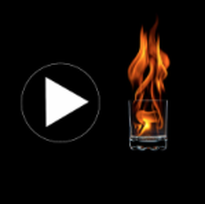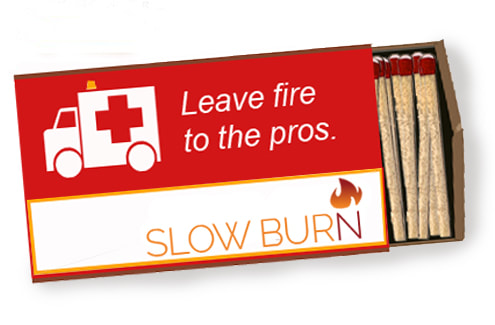|
Something happened last week.
It gave your faithful screedmeister here a wakeup call. I may be in trouble. You may get to witness the unraveling of everything that has happened here since January 16, when we unleashed the madness of "They All Laughed When I Tried To Write Better Advertising..." The title is an allusion to the classic John Caples headline for a home-study music school: "They laughed when I sat down at the piano--but when I started to play!" As you know, if you've been around for the last two installments of the weekly screed, we've been indulging in a protracted answer to a question from Mr. Chris Pollard, a radio creative director in Dryden, Ontario. HE WANTS TO KNOW HOW TO GET AFFORDABLE TRAINING FOR HIS CREATIVE STAFF Many of the affordable alternatives that used to be available have fallen off the edge of the earth. So far, the dubious counsel we've given is that his people should become geeks for advertising, as well as geeks for life, the universe and everything. This is nail-on-the-head advice for anyone in any situation who wants to create good advertising. Last time, the promise was made that a more practical and concrete answer to Mr. Pollard's question would be forthcoming. Then, last week, an email arrived. It came from Brian Tepper, Mr. Pollard's compatriot at Acadia Broadcasting. SEEMS THIS SERIES OF MISSIVES IS CAUSING A STIR People at the company are paying attention. Mr. Tepper also told me about many of the things that are being done to make their copywriters better. And some resources I was going to suggest have already been put into play. Eegad! What have we done?! The build up to this week's concrete answer is shot to hell! Your faithful scribe has painted himself into a corner from which he cannot escape! Unless... Just maybe, there are more answers that none of us had anticipated. And here's why I say that. MR. TEPPER ALSO REVEALED SOME SPECIAL CIRCUMSTANCES It seems their company has some unwitting copywriters. During a round of layoffs--which became epidemic in radio a few years ago and have persisted--some traffic people were let go from the traffic department. But they were allowed to assume the mantle of copywriter. This is truly impressive and unusual. I compare it to someone who's been working in air traffic control. They've had a career telling the planes where to land when. It's a fairly rigid environment--there are limited options for creating success. It's all very detailed and well outlined. ALL OF A SUDDEN, THAT AIR TRAFFIC CONTROLLER GETS LAID OFF And that person is told, "But, now you're going start designing and building airplanes." Neat trick! Someone who has always worked within a specific range of parameters with limited options for creativity is suddenly thrust into a job that is completely the opposite. There are no limits beyond the length of the commercial. And now, without ever having designed a plane, this person has to figure out how to build wings and take flight! Red Bull might give you wings, but a sugared-up caffeinated energy bomb is not going to solve this one. But here's the good news: unlike with planes, at worst, if they fail, nobody gets hurt. And at best, I still believe it is entirely possible to make this work in ways that nobody ever anticipated. THESE PEOPLE DON'T BRING THE BAGGAGE OF HAVING ALREADY BEEN PROFESSIONAL WRITERS One of the problems with writers, especially young ones, is often they feel they have all the answers. I know. I was one of those writers. The creative ego can run away with things. When rejected, the ego-fueled writer says things like, "They just don't understand my genius." Well, sometimes that writer doesn't understand what he's doing. Too often, he's just amusing himself at the expense of the client's advertising budget. But when the writer starts to realize that his oh-so-amusing unbridled creativity isn't the only thing that the job requires, and that there are so many technical and psychological underpinnings that actually make a radio commercial generate results, things evolve. And the writer becomes better and more effective. THE TRAFFIC PEOPLE PROBABLY DON'T SUFFER FROM WRITER'S EGO But what they do have, typically, is an ability to use a left-brain approach to things. They understand order and details. They haven't spent their careers trying to fill up a blank page with words that inspire people to action. They've spent their careers keeping things organized and running smoothly. So now, the trick is to give them new skills to help them fill up that blank page while trying to bring order to the daunting chaos it represents. All kinds of wild and crazy things can happen on that page. At some point, however, the things that happen there have to be tamed. And a left-brain sensibility can be useful. The trick? DON'T LET THE LEFT BRAIN SQUELCH THE RIGHT BRAIN BEFORE THE GOOD STUFF HAPPENS This isn't a unique challenge. It happens to everyone who isn't a writer. They sit and stare at a blank page, and experience fear and loathing. And the sensible left brain says things like, "Oh, that'll never work. You can't do this. That's a crazy idea. Let's go get some poutine." Then, the writer gets loaded up on carbs, needs a nap, and nothing gets done. THE PAGE REMAINS BLANK Fear of the blank page is common. Getting over that requires the courage born of realizing that this fear is pointless. The fear of jumping out of an airplane, crossing an ocean in a sailboat, stepping backwards off of a rock face with a rope in your hands, those things are all legitimate fears based on the action and its potential to end your life. Where does the fear of a blank page come from? "If I write the wrong words, I could explode!" The quick brown fox jumps over the lazy BLAMMO! Not gonna happen. I BELIEVE IT'S THE FEAR OF FAILURE The fear of not being good enough to do it. The fear of being judged. All kinds of imagined social disappointments are conjured up by the prospect of filling that clean white page. It ain't gonna happen. And the only way to understand that is by actually following the advice of noted journalist, novelist and suffragette Mary Heaton Vorse: "The art of writing is the art of applying the seat of the pants to the seat of the chair." That's how you start. "I can't do it" is no kind of excuse. And when you learn how simple it is, and how there are rules for making it all better, it stops being daunting and starts being a delight. BUT THIS DOES NOT ANSWER THE QUESTION! Where is the affordable training?! I'm about to answer that question. But first, know that this discussion about how to write better advertising, is going to continue. There's just too much ground to cover. We might be brand-focused obsessives over here, but we are also writers and are obsessive about that, too. So we're going to talk more about writing and how to be on brand with effective copywriting. In the meantime, as discouraged as I am by the fact that the gents in Canada are already using the resources I would've suggested, there are a couple more. FIRST, EVERYONE NEEDS TO KNOW THAT THE BLANK PAGE WILL NOT HURT YOU It is not a loaded gun. Second, for a practical solution to training writers, the Radio Advertising Bureau has a program that they developed with Dan O'Day. It's called CPCC: Certified Professional Commercial Copywriter. I find the CPCC a less than perfect solution for the non-writer, because it's specifically about creating radio advertising. Copywriters need a foundation beyond radio. But in an age when corporate needs to justify the expense from the perspective of ROI, this is a good solution: a certification program that gives the writer a credential, which can be shown to the client as a measure of authority (and can help close the deal), and in which a true expert in the genre imparts his wisdom in a practicable and easy-to-understand fashion. I've known and worked with Dan O'Day for 20 years. We occasionally have healthy differences of opinion (like the veracity of Bud Light's "Real Men Of Genius" campaign), but we agree on most things. And when it comes to training Dan is a rock. This is important stuff. http://www.rab.com/public/academy/onlinecourses-sales.cfm NEXT, BECOME A LISTENER Listen to all kinds of radio, not just advertising. But definitely, listen to award-winning radio. Go to Radio Mercury Awards dot com and listen to the winners. Among other things, understand why the Richards Group continues to crush it in this competition, especially with the 30-year juggernaut of Tom Bodett for Motel 6. Not all of the advertising you hear there is necessarily good or effective, but it does give you an idea of what is possible with nothing more than a few words and some music. Occasionally, some sound effects. It helps you to think like a radio pro. I have a lifetime of thinking like a radio guy. When I was a little kid, my parents would wax poetic about the impact of dramatic radio shows, so I would find them and listen. Then came Cheech & Chong records which, 1970s dope humor aside, had some excellent production value. Later, The Firesign Theater, which had some of the most absurd writing and mind-bending production around. But it was the Radio Mercury Award winners that really upped my game. Not to mention entering the Mercury Awards and not winning upped my game. It's an important bar to have. When you have skin in the game and you lose, it give you a perspective unattainable in any other way. And that is how I finally became good enough to win my own Radio Mercury Awards. Twice. BUT SOMETHING ELSE HAPPENED I also lost interest in awards. Because ultimately, it's about something more. It's about performing for the client. And when you start getting good enough to win, and you also start generating ROI, it changes everything. The client entrusts us with their brand. They rely on us to do something they can't do. It's up to us to work the game and develop the chops required to make their customers sit up, take notice, and respond. And when you get to develop a juggernaut of a campaign based on a solid brand (that you may have also helped define), it's a little like famous ad man Jerry Della Femina once said: "Advertising is the most fun you can have with your clothes on." As always, Blaine Parker Your Lean, Mean Creative Director in Park City
0 Comments
DID I GET IT WRONG LAST TIME?
If you were paying attention to the last screed, we left halfway into answering a question from Chris Pollard, champion radio creative director in Ontario, to wit: "How do we move the needle?" He's asking how to get affordable training for the people on his staff so they can create better radio advertising. One of the first things I said was: Even if you don't care about radio, stick around. This is going to be worth it. And I still stand by that. Thank you for being here. However, last time, my first recommendation to anyone wanting to create better advertising was to become a geek for advertising. It doesn't matter what kind of advertising you do, you need to understand techniques and history. DID I JUMP THE GUN? In preparing for this follow up, I realized: Uh-oh. Did your relentless scribe put the cart before the horse? Last week, I invoked the name of the father of Guerrilla Marketing, the late, great Jay Conrad Levinson. Back in the day, he had the good fortune to be hired and then fortuitously fired by Howard Gossage, the brilliant eccentric and marvelously creative ad man who ruled advertising from atop a converted firehouse in San Francisco during the '60s. The delightful quirk that drove so much of Mr. Gossage's work no doubt rubbed off on Mr. Levinson, who offers a directive in his bible of guerilla marketing. And that directive is blindingly important in this whole question of how to create better advertising. He said, "Get people's attention." WELL, DUH. OF COURSE YOU WANT TO GET PEOPLE'S ATTENTION. But wait there's more. He went on to say something that so many people creating advertising never stop to consider. "People do not pay attention to advertising." What?! Eegad! Blasephemy! People do not pay attention to advertising?! Why should they not be interested in the brilliant words that come streaming forth from my word processor! Why not, indeed. As Mr. Levinson continues, "...they pay attention only to things that interest them. Sometimes, people find those things in advertising." Getting their attention does not mean yelling, "Free beer!" And then saying, "Now that I have your attention, I'm selling this horse." It means something else. "TO BE INTERESTING, BE INTERESTED." No, that is not Mr. Levinson speaking. Nor is it David Ogilvy, as the internet meme machine would like you to believe. I can guarantee this, because the quote appears two thirds of the way down page 88 of that grand old chestnut of persuasion, How To Win Friends And Influence Peopleby Dale Carnegie. If people pay attention to what interests them, and you wish them to pay attention to your advertising, it becomes necessary that your advertising is interesting. And this takes us to a very basic element of writing great advertising. It's not about advertising. IT'S ABOUT PEOPLE And this is where we should've begun the discussion. Not at becoming a geek for advertising. But at becoming a geek for life, the universe and everything. Anyone can explain the basic mechanics of creating an advertisement. But what can't be taught is a curiosity about the world outside the advertisement. And that's something you find in all the great advertising writers who have come down the pike. To a person, they are interesting--but more importantly, they are interested. And I guarantee you that when Mr. Pollard in his office in his radio station in Dryden in Ontario in Canada at the top side of North America hears this, he's going to wonder what the heck has happened. ALL THIS MAN WANTED WAS ADVICE ON RADIO TRAINING He's received commentary on advertising geekdom, is now being told that an interest in life, the universe and everything is really what every writer needs, and what on earth is he supposed to do with that? I feel your pain, Mr. Pollard. It's frustrating for me, too. Don't worry, we will get back on topic. But first, we need to beat this mule some more. Too much thinking in business (and in life) is channeled and labeled and siloed and stratified and packaged and otherwise rigidly defined. There is no room for anything that isn't categorized. EVERYONE WANTS WELL-DEFINED ANSWERS AND SOLUTIONS Understandably. Here's the problem with talking about training people to create better advertising. There's no on-off switch. You can't just send someone to a training program and come out with a top-notch copywriter or a genius voiceover performer. It's all a process. And the process begins a long time before someone walks into a radio station or an advertising agency or even your business and says, posing with arms akimbo, "I am writer!" Instead, they've spent their lives, walking around and bumping into things, wandering down the road less traveled, wondering "What the heck?", and asking questions. AND THIS IS KEY Good advertising writers are interested. They have curiosity. They want to know more. They ask questions. Then, when it comes time to write an ad, after they've asked all kinds of questions about what they're supposed to be selling, they have no problem sitting down writing endless awful advertisements for it. ONE NEVER WRITES A GOOD AD BEFORE ASKING QUESTIONS AND WRITING CRAP One big problem? A lot of people stop at the crap. They think it's good. They parade it around and people applaud. Because maybe it's clever. Maybe it seems like an advertisement. But in reality, all it really is, is an ad-like object. The world is filled with ad-like objects. You see them and hear all the time. And they make you feel nothing--unless they make you feel the wrong thing. OFTEN THEY'RE FUNNY And there's nothing wrong with funny advertising. But funny is not the goal. Funny by itself makes the prospect feel the wrong thing. The funny needs to be relevant. The funny needs to connect with the sales message. And this is one of the big challenges we face. Especially in radio, there's a perception that advertising needs to be funny. No! Advertising needs to be relevant. That doesn't mean it needs to be a "buy now, but wait, there's more, there's never been a better time to buy this baloney!" pitch fest. AN INTERESTED PERSON UNDERSTANDS PSYCHOLOGY Not formal psychology. I took psych 101 in college. It was awful. And was obviously taught by somebody badly in need of a psychologist. We're talking practical psychology, or whatever else you want to call it. Mindset. Thinking. Makeup. Sensibility. Consciousness. Attitude. Feeling. Ah, there's that word. "Feeling." How does the advertisement make the prospect "feel." The interested copywriter understands this. The interested copywriter understands the feelings of the person to whom they are speaking, and how to hit the emotional trigger that makes that prospect feel, "Here's the solution to my problem." THAT'S PART OF EMOTIONAL INTELLIGENCE And that kind of emotional intelligence about the craft comes from spending life, walking around and bumping into things, wandering down the road less traveled, wondering "What the heck?", and asking questions. It does not come from saying, "Hey, we're gonna write a funny ad that wins an award!" Before anything else happens, the right person with the right attitude has to be at the helm of the great ship HMS Word Processor. Fortunately for the indubitably frustrated Mr. Pollard in his radio station in Dryden, Ontario, Canada, North America, 49 degrees 47 minutes North, 92 degrees 50 minutes West, we will be getting around to a practical and concrete answer to his question next time. As always, Blaine Parker Your Lean, Mean Creative Director in Park City "HOW DO WE MOVE THE NEEDLE?"
That's the question. It comes from Canada via Chris Pollard, Creative Director at 92.7 CKDR in Dryden, Ontario. And even if you don't care about radio, stick around. It's going to be worth your while. When we threw out the solicitation for your burning questions about branding and marketing, Mr. Pollard was first out of the gate. He asked, "How do we move the needle?" Normally, the phrase "moving the needle" is a reference to generating sales for a client. Creating advertising that sells more product is moving the needle. But in this case, Mr. Pollard is talking about training his team in making better, more creative and more effective advertising. He says, in part, "A lot of marketers out there...want to improve their skills. But training opportunities are sorely lacking. Is there something out there we're missing? My corporate cohorts and I have discussed it several times over the years, and our searches always come up empty." I can guarantee you, the answer is not one he's expecting, and it's going to be more applicable across the board than you expect. RADIO IS A VAST WASTELAND With apologies to erstwhile FCC Chairman Newton Minow, whose famous "vast wasteland" speech to the National Association of Broadcasters in 1961 sent TV programmers a searing message about the quality of their content, radio has become a creative desert. A fact of the business is that wildly talented and dedicated people get sacked because they're "too expensive." More and more, everything is run by beancounters lacking insight, employing low-wage bean counters who lack skill or intellect, supervised and trained by people who aren't all that great, either. or, who have just given up and do what they can with what they're given. (I am not painting Mr. Pollard's employers with this brush. They seem to be an exception.) Mr. Pollard goes on to talk about the few, expensive courses out there, and the many affordable ones--many which have fallen by the wayside because nobody can get their stations to pay for them. So the real question is: Where is the affordable training? To which I say: It's all around you. Just do it. Become A Geek For Advertising Not just radio, but all advertising. I'm routinely shocked how many radio people do not have any comprehension of how advertising works, what constitutes good advertising, and how they know nothing about advertising history. Radio has its uniqueness, for sure. But it also shares commonality with all advertising in that it's a form of persuasion. It doesn't matter what kind of advertising you do, you need to understand techniques and history. If you say "John Caples" to most advertising (and radio) people, they look back at you with all the comprehension of a Labrador retriever. IF YOU MENTION CAPLES' MOST FAMOUS HEADLINE? You might get a smattering of more comprehension. The famous headline is, "They laughed when I sat down at the piano--but when I started to play!" It's an ad for at-home music courses, and it is famous in advertising to the point of being a cliché. The ad taps into the emotional desires we experience as humans. It features a cliffhanger headline that makes the reader say, "Tell me more!" It makes the pitch with a human and real sounding story from a happy customer. It's a brilliant lesson in how to make an ad work--and it was written almost 100 years ago. Caples also wrote a landmark book called, Scientific Advertising. Caples had no patience for funny advertising, and he's very dry. But the book has valuable lessons. There's even an awards competition named in his honor that requires entrants to prove how well their advertising worked. Besides Caples' book, there are also plenty of other books available to anyone who's interested in understanding the history and fundamentals. Yes, times and fashion change. FUNDAMENTAL HUMAN PSYCHOLOGY DOES NOT That's why so many books on advertising, while being out of date as fashion goes, still provide a killer education in advertising. Just for example... Ogilvy On Advertising One of those old chestnuts about the business, it too provides important information about how to craft advertising. And if you read it, you will learn why Ogilvy loved radio and called it, "The Cinderalla medium." Bill Bernbach's Book An incredibly expensive book because it's out of print. But it's a lesson from a man who changed the face of US advertising almost singlehandedly. It's filled with simple and pithy advertising that provides brilliant examples of conceptual thinking that make you stop and say, "Wow." The ojne ad you probably know: Vollkswagen "Think small." When Advertising Tried Harder Like the Bernbach book, this is also out of print and expensive. But it provides a litany of pithy, in your face ads that, again, helped change the face of advertising. Hey Whipple, Squeeze This Luke Sullivan's "Classic guide to creating great ads" is funny and potent and irreverent and will make you spit chocolate milk out of your nose. Well, maybe not the latter. But it's an excellent guide. Wizard Of Ads If you haven't read Roy Williams' first book, get it. Now. AND ONE OF MY PERSONAL FAVORITES... The Book Of Gossage This is an enormous and heavy trade paperback about a cult figure in 1960s San Francisco advertising, Howard Luck Gossage. This is the man who coined the phrase, "When life gives you lemons, make lemonade." Gossage had his ad agency in a converted firehouse. He was an intellectual eccentric who once fired a junior copywriter by the name of Jay Conrad Levinson. Yes, the father of Guerrilla Marketing worked for Gossage, and one day after submitting a copy assignment, Levinson got it back with a note that said something to the effect of, "There's nothing more I can teach you. You're fired." Levinson has a chapter in the book. Jeff Goodby wrote the introduction. If you don't know who of either of those people are, you're way behind the curve. YES, ALL OF THE BOOKS ARE ON ADVERTISING IN GENERAL Not radio. And they are useful informative, and important. Each of them, in their own way, leave you thinking, "Wow, that's good." At Slow Burn Marketing, we have always maintained that small business advertisers can take many cues from big advertising agencies. And these books are just part of the legacy that Big Agency Advertising has to offer the small-business advertiser--even one who works in radio. This rant is going to go on into next week. There's too much more to say and not enough time in which to say it. But once again, if you want to create better advertising, stick around for next week. It'll be worth it. As always, Blaine Parker Your Lean, Mean Creative Director in Park City WHY ARE YOU EVEN DOING THIS?
As a faithful follower to this weekly screed, you have some kind of interest in advertising. Whether you create advertising for yourself or for someone else, you have some vested interest in "Getting your name out there." Which, frankly, is a really weak goal for advertising. "You gotta get your name out there, kid." There are plenty of names out there. Do you care about them all? Any of them? What names do you care about? You care about the names that make you feel something. Ah, feelings. HOW DO YOU MAKE PEOPLE FEEL? This screed makes you feel something. Some people love it. I have the fan mail to prove it. Some people hate it. Sometimes, when I write things that don't toe a particular party line, people feel insulted and they unsubscribe. So it goes. Their loss. But feelings are at the root of everything we do in creating advertising. Creating an effective advertisement requires understanding how to make a single, defined individual feel the right thing about that which is being sold. THERE MUST BE A RELEVANT ELEMENT OF ART, POETRY, SHOWMANSHIP, FINESSE, SOMETHING An advertisement can't just be a Post-it Note that says, "Yeah, we sell that, too!" And, unfortunately, that is what so much advertising is. "Hey, we sell this for all your fill-in-the-blank needs!" Which brings us to why I'm even on this tear. Something happened over the holidays, and it represents a great loss to many people, including those of us with a fondness for smart radio advertising that means something. ON CHRISTMAS EVE, WE LOST A LEGEND The radio advertising genius Dick Orkin went to the great Radio Ranch in the sky. Dick was 84. And he was perhaps one of the single best minds ever in advertising. His specialty was radio, but his brand of thinking informed advertising at large for anyone willing to pay attention. His brand of thinking is especially useful now, in our age of not-too-deep thinking and information overload. Dick was no dummy. He had a bachelor's degree in speech and theater from Franklin & Marshall, a master's in clinical psychology from the Phillips Graduate Institute, and studied for his MFA at Yale. DICK KNEW THINGS One of the things he knew, and which informed everything in his work, was how to matter to the listener. His Famous Radio Ranch was known for developing funny radio campaigns. The Radio Ranch had a wealth of advertising trophies backed by an abundance of impressive, results-producing campaign credits for businesses across the nation and even across the ocean. Long before I knew who Dick Orkin was, I knew his work. It leapt out of the radio, grabbed you by the ears, made you listen--and made you care. When I was eventually working in Los Angeles radio, I had the good fortune to learn from Dick at industry seminars, and later in private sessions and classes at his home in Toluca Lake. DICK WAS A THINKER AT A DEEPER LEVEL One of the things that so many radio advertisers want to have is a "funny commercial." There's a kind of conditioning that has come with Big Agency Advertising, and it's the (sometimes) misguided notion that advertising needs to be funny. In past screeds, we've dismantled that notion and proven that funny doesn't sell. Relevance sells. It doesn't hurt if it's funny. But it must be relevant. Dick was happy to explain how to be funny, and how to make it relevant at a deeper level than most slap-dash comedy radio commercials ever reach. DICK ALSO SHARED THE UNDERPINNINGS OF HIS PARTICULAR BRAND OF GENIUS In searching for examples of Dick's work, I came across a YouTube clip. It was posted by Dick's good friend, radio guru Dan O'Day. For years, Dick and Dan worked together, training radio professionals in ways to make better radio. One of the Dick Orkin presentations that Dan sells as an info product is called, The Architecture Of Comedy. In the YouTube clip, before we get there, Dick has been playing radio commercials for the audience, and discussing how the comedy works. He then says, in part: [The] fact that sex and death are the basis of so much humor, including some of the materials that you've heard in the commercials here, is because these are things largely out of our control. If we could control them, of course, life would go swell, because everything is in our control. It's a perfect world. But we know it's not a perfect world. Everything human is pathetic. As long as a person takes themselves seriously, there will be humor in the world. Because we're taking ourselves seriously in the face of an imperfect situation and an imperfect world. Only man has dignity. Only man, therefore, can be funny. THIS IS NOT STANDARD COMEDY INSTRUCTION THINK Dick goes on to talk about pomposity, ego inflation, ego deflation, the comedy of Type A versus Type B personalities, the awareness and the capacity to understand living in a world where things go wrong and you can laugh at them, the sense of maturity and self-worth required for that, and how a sense of humor is the ability to avoid getting caught in mind ruts where you can't see the opposite. This is somewhat different than the standard "comedy rules" type of instruction that often comes from comedy experts--things like "Use The Comedy Rule of Threes." There are all kinds of technical rules that help make comedy work. But rarely does any guru talk about the human condition and the underpinnings of life that need to be understood before trotting out those rules. DICK PROVIDED SOMETHING THAT IS SORELY LACKING RIGHT NOW He provided thoughtful insight into that which lies beneath the craft. He had a depth of knowledge in performance and psychology that he was readily willing to share. In the present info-overload culture, the kind of depth that Dick brought to his how-to insight are sorely lacking. Tools and tricks and surface features are often all anyone gets. They get only the tip of the iceberg. The iceberg's foundation--the 90% of the substance that makes it possible--is hidden beneath the surface. Dick was great at revealing the foundations and making them relevant and useful. And without relevance and usefulness, where are we? Dick Orkin has left the ranch. Long live Dick. As always, Blaine Parker Your Lean, Mean Creative Director in Park City  ...or list to it in the author's own voice here. ...or list to it in the author's own voice here. IT'S A NEW YEAR--WHAT ABOUT THE NEW YOU? Happy 2018! Presumably you had a fabulous last night of 2017, celebrating the fact that we all still have a planet and that nobody with their finger on the button did anything rash. Happy New year, indeed. So, now that the holidays are behind us, what's on your mind, branding- and/or marketing-wise? What burning question is nagging at you for the new year? As I do every year, I throw this question out to you, inviting you to pitch your query my way. What is on your mind for 2018? Is it about how to enliven a stagnating brand? Is it about how to harness social media for fun and profit? Is it about the fallacy of saying your business's name in the first seven seconds of any radio commercial? Maybe you want to know how to establish a de facto brand for a radio advertising client on your air. YOU HAVE A HIGH-PRICED SMALL-BUSINESS BRANDING CONSULTANT AT YOUR COMMAND! This week only! I will answer your question here in the screed. Just send your email to submissions at slow burn marketing dot com. Here's to plenty of water under your keel in 2018. Cheers! As always, Blaine Parker Your Lean, Mean Creative Director in Park City |
AuthorBlaine Parker is prone to ranting about any and all things related to brand. In many ways, he is a professional curmudgeon. While there is no known vaccine for this, the condition is also not contagious. Unless you choose it to be so. Archives
February 2022
Categories
All
|
|
© Copyright 2020 Slow Burn Marketing LLC |





 RSS Feed
RSS Feed

